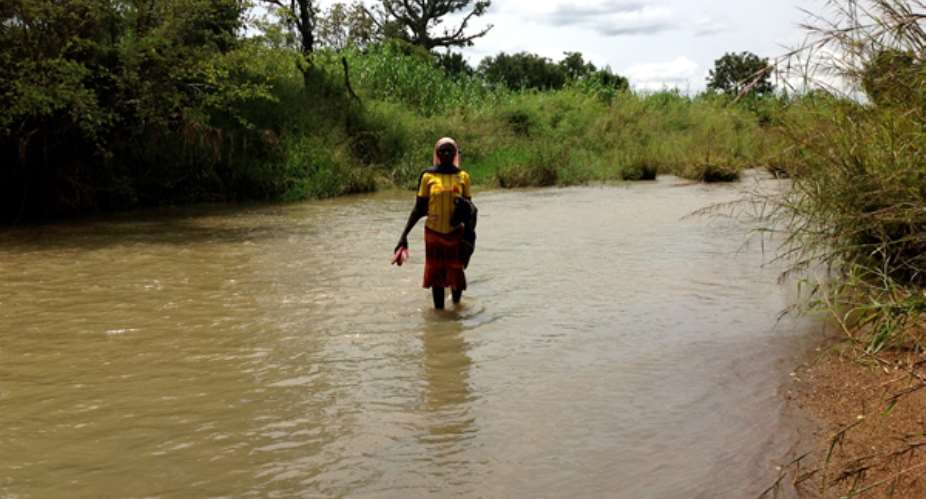Have you ever imagined living in a community that is without electricity, toilets, health facilities, school and water? That is the situation the people of Wiakabo in the Upper West Region are grappling with.
They have done everything possible to change the conditions in the community but nothing appears to be working.
They are now looking up to God, not government to come to their aid.
Wiakabo is a farming community with over one thousand two hundred residents. Apart from arable land and animals-the few resources they can boast of- there is nothing in this community that can entice anyone to stay there.
It is not therefore surprising that only one student has so far made it to SS1 at Tuna Senior High school, the highest ever educational level to have been attained by a resident.
The road to the community is not one for the faint hearted as it looks more of a muddy path for combine harvesters than one for normal vehicles.
Forty-five year old Tomisha Mwinuori is a mother of eight and has lived in this community her entire life.
Wearing a white T-shirt over a green cloth and with a zebra striped muffler to march, Mwinuori narrated the story about her life and that of the village.
Her first name literally suggests- work is better. Mwinouri sells charcoal to raise some income to complement the efforts of her husband from his farm.
''Our husbands after the farming season took whatever they want from the farm and dumped the remaining foodstuff on us.
"They don't care where we get the cooking ingredients from. They expect to see food on their tables and anything short of that will result in slaps. In order to avoid that, I got into the charcoal business and that is what all of us have been surviving on,'' Tomisha posited.
The greatest challenge the people face is getting portable water. For majority of them they have never seen a borehole in their life, let alone talk of potable water to drink.
The only semblance they have of a borehole was one that the district assembly dug over six months ago and left abandoned after digging only the hole. Meaning they have to rely on the milky coloured water from a nearby valley and with stiff competition from their animals.
''We compete with our sheep, goats and pigs for the dirty water. We know that water is colourless and we know that what we drink is not good for us but it is better than nothing. We have been getting diseases from it. How can a human being share water with animals and expect not to be sick. We have complained severally to leaders but they wouldn't listen. Now we are praying to God to come and help us," she added.
Worse still, the valley separates Wiakabo from Kenyiri community and the residents from both communities sometimes have to swim on a rainy day from one end to the other before they can visit each other.
Pregnant women are not spared either as I met two of them holding their clothes high up to their hips in order to cross and attend to antennal care outside the community.
As a result of the rains, the education of children at Kenyiri is now on hold for the past six months and they will only resume schooling after January.
The assembly man for the Sanuori electoral area expressed his frustration about the situation.
"There is a community up there where the children have stopped coming to school three months ago because of the rains. They can neither walk nor swim across the water and for them to be alive they have to remain there. They will resume schooling after the rains stop in January. The question we have been asking is whether it is really a curse to come from this area. We have told the district assembly and they told us it is beyond their means unless intervention from central government. We have spoken to our MP but nothing better is coming from it. We are now looking up to God to save us,'' he lamented.
The District Chief Executive for Wa West, Adamu Dassaana who was in the community for the launch of the Complimentary Basic Education programme, agreed to speak to us on the challenges the people go through but sped off after the programme.
The residents told Joynews that they were not surprised about his behaviour as they believe nothing good would have come out of the interview.





 Akufo-Addo commissions Phase II of Kaleo solar power plant
Akufo-Addo commissions Phase II of Kaleo solar power plant
 NDC panics over Bawumia’s visit to Pope Francis
NDC panics over Bawumia’s visit to Pope Francis
 EC blasts Mahama over “false” claims on recruitment of Returning Officers
EC blasts Mahama over “false” claims on recruitment of Returning Officers
 Lands Minister gives ultimatum to Future Global Resources to revamp Prestea/Bogo...
Lands Minister gives ultimatum to Future Global Resources to revamp Prestea/Bogo...
 Wa Naa appeals to Akufo-Addo to audit state lands in Wa
Wa Naa appeals to Akufo-Addo to audit state lands in Wa
 Prof Opoku-Agyemang misunderstood Bawumia’s ‘driver mate’ analogy – Miracles Abo...
Prof Opoku-Agyemang misunderstood Bawumia’s ‘driver mate’ analogy – Miracles Abo...
 EU confident Ghana will not sign Anti-LGBTQI Bill
EU confident Ghana will not sign Anti-LGBTQI Bill
 Suspend implementation of Planting for Food and Jobs for 2024 - Stakeholders
Suspend implementation of Planting for Food and Jobs for 2024 - Stakeholders
 Tema West Municipal Assembly gets Ghana's First Female Aircraft Marshaller as ne...
Tema West Municipal Assembly gets Ghana's First Female Aircraft Marshaller as ne...
 Dumsor is affecting us double, release timetable – Disability Federation to ECG
Dumsor is affecting us double, release timetable – Disability Federation to ECG
